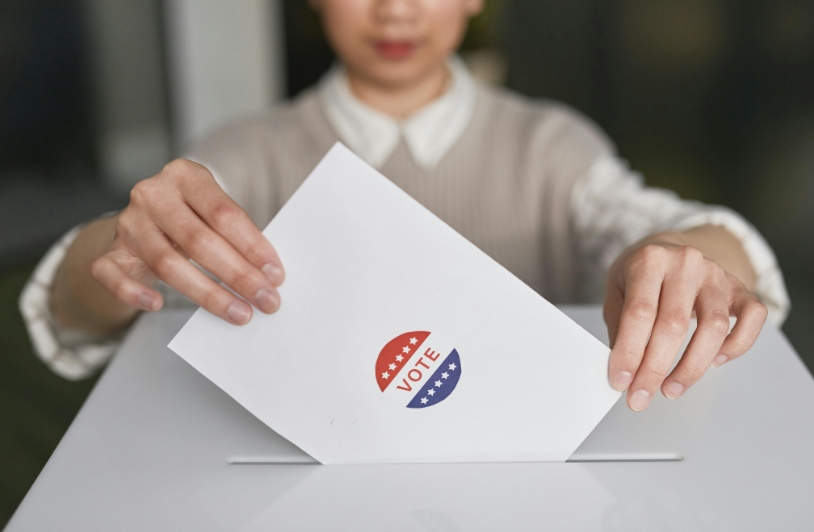Men Have Long Intimidated Women in an Effort To Ensure They Vote the Same, Though Women and Men Have Long Been Split in Their Politics.
Originally published by The 19th
The gender divide this election cycle can perhaps best be summarized by a TikTok trend.
Videos across social media show women who are voting for Vice President Kamala Harris on their way to the polls to “cancel out” votes from their husband, father or other men in their lives who are supporting former President Donald Trump. The majority center on women who feel a vote for Trump, who appointed the justices that helped overturn Roe v. Wade, is an affront to their bodily autonomy.
It’s a trend that has inspired campaign ads on the left and sparked ire on the right, all while giving a glimpse into just how split men and women are about the man and the woman at the top of the presidential ticket. And while it’s unclear just how much it’ll reflect the actual gender gap this election cycle, it’s certainly turning the conversation in the last days of the campaigns toward an often-unspoken reality: Men have long intimidated women in an effort to ensure they vote the same, though women and men have long been split in their politics.
So far, early voting data shows a 10-point divide in voter participation between men and women in battleground states, according to a Politico analysis. Women are more likely to vote Democrat.
But it’s still not clear how significantly different the gender gap is this election compared with past elections, and it won’t be clear until all votes are in. About 20 percent of people are in marriages where their party is different from their spouse’s and there’s evidence that number has actually been declining over time.
“Assuming the trend of mixed-party partnerships is downward, I’m not sure that we should expect the existence of [the videos] to be significant enough to alter the aggregate gender gap in any large way,” said Kelly Dittmar, an associate professor of political science at Rutgers University and the director of research for its Center for Women and Politics.
And the decisions behind votes are often multifactorial, going beyond one identity. For example, White women are far less likely than Latinas or Black women to overwhelmingly vote Democrat.
So far, there are some signs that Harris has been widening her lead with some groups of women, including a 19 percentage point lead with suburban women, according to a late October ABC/Ipsos poll. Men, meanwhile, and especially young men, have been swinging toward Trump by as much as 14 points compared with 2020, according to a recent Harvard Youth Poll.
If the rift between men and women widens, abortion could be part of the reason. Data shows that Democratic and Republican women are more likely than men in those parties to be influenced by a candidate’s stance on abortion, which is often one of the top election issues among women — though not usually the top issue, Dittmar said. During the midterm elections in 2022, which came just months after Roe v. Wade was overturned, women’s stance on abortion was a powerful motivator that led Democrats to a stronger-than-expected showing.
Trump has acknowledged that abortion may be keeping some women from supporting him. “Without abortion, women love me,” he said on Fox earlier this month.
A story in The Cut this week details the stories of four women who are married to men who support Trump. Three of them cite reproductive access as one of the big issues dividing them, including one woman who struggled to get care after a miscarriage in Texas.
“I was at home by myself with my 3-year-old daughter and I thought I was going to die,” she said. “The fact that he didn’t seem to care about that is heartbreaking.”
But in a presidential election where turnout is higher, “it remains to be seen if this issue will yield a markedly different turnout overall or by gender, and if we can attribute it to gender,” Dittmar added.
Nevertheless, campaign ads are seizing on any possible political momentum behind the “cancel out his vote” message.
In one ad out this week, by Vote Common Good, a nonprofit that targets religiously motivated voters, a woman enters the ballot box after her husband, whose bald eagle emblazoned cap and Southern accent seems to be a nod toward him being a Trump supporter. She looks around and locks eyes with another woman before casting her vote for Harris.
“In the one place in America where women still have a right to choose, you can vote any way you want and no one will ever know,” Julia Roberts narrates. “Remember, what happens in the booth stays in the booth. Vote Harris-Walz.”
In another ad, by the Lincoln Project, a political action committee formed by Republicans to defeat Trump, two men chat outside a polling location about how their wives are going to vote for Trump, even though they don’t like the former president. But inside their polling booths, the women exchange a glance and one mouths, “Kamala” before they both — along with other women in the same location — fill the bubble next to the vice president’s name. “Your vote is your secret,” the ad reminds voters. “He’ll never know.”
The ads indicate that keeping opposing votes a secret spares women from their husbands’ anger. Conservative news commentators seemed to confirm this hunch this week as the ads and TikTok trend went mainstream.
Fox News host Jesse Watters said this week that if he “found out Emma was going in the voting booth and pulling the lever for Harris, that’s the same thing as having an affair,” a topic with which he has personal familiarity given that Emma DiGiovine, his second wife, is the person with whom he cheated on his first wife.
Former House Speaker Newt Gingrich also said Thursday night that the ads are an example of Democrats’ dishonesty.
“For them to tell people to lie is just one further example of the depth of their corruption. How do you run a country where you’re walking around saying, ‘Wives should lie to their husbands, husbands should lie to their wives?’” Gingrich said on Fox. Gingrich also had an affair during his second marriage to the woman who would become his third wife.
“The backlash from certain men who are horrified to think their wives might disagree with them actually proves our point,” said Vote Common Good’s Executive Director Doug Pagitt in a statement. “We know the MAGA movement is putting increased pressure on people, but we also know the strong will of Americans when they stand in the voting booth.”
The trend online has drawn emphatic reactions from women who say those at odds with their husbands should divorce them. But as some of the women who have told their stories explain, those decisions are complicated.
“I totally get why some people feel it is a massive deal-breaker. However, not everybody can instantly leave a relationship,” said the woman in The Cut who had a miscarriage. “If I could leave him, I would. But you need two workers to raise a family. I am in this. I have the option to stay and try to change his mind, or I can leave and potentially be homeless with my children. So I’m gonna stick it out and try to get him to come around.”
With days left until Election Day, the trend is now turning to show men who are joining in their wives’ support for Harris. How much that bears out remains to be seen. Men have generally supported the Republican candidate in every presidential election since 2000 save 2008, when they were evenly split on John McCain and Barack Obama.
The newer videos start with the same text, “On my way to cancel out my husband’s vote,” before a jump cut.
“Just kidding,” one says. “This is my husband,” it says over a video of a husband wearing a Little Mermaid costume and a red wig as their daughter passes by in a matching costume. “He would never vote against someone who wants to take away my rights/our daughter’s rights.”
CLICK HERE TO DONATE IN SUPPORT OF OUR NONPROFIT COVERAGE OF POLITICS




